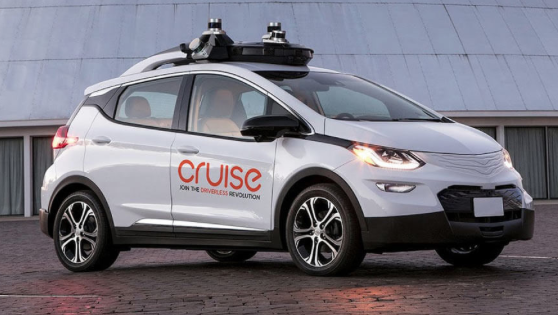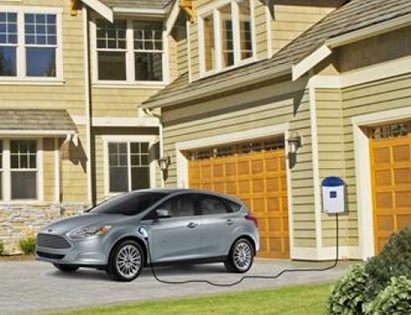GM asks for approval of electric, autonomous rides by 2019: General Motors could be launching public ride-hailing services in autonomous vehicles as early as next  year, according to a petition filed with NHTSA. GM has asked for a Federal Motor Vehicle Safety Standards waiver on 16 rules covering vehicles with human drivers but that don’t apply to self-driving cars. If granted, GM could launch as many as 2,500 autonomous vehicles a year starting in 2019. The automaker described the “Cruise AV” self-driving vehicle in the filing, which is based on the Chevy Bolt and includes fourth-generation AV technology from its Cruise Automation subsidiary. It includes five Lidars, 16 cameras, and 21 radars for safety and functional, efficient driving. GM says its would be a type of robotaxi providing ride-hailing services. GM’s Maven carsharing division and its investment in Lyft could provide channels for bringing these electric, autonomous rides to customers.
year, according to a petition filed with NHTSA. GM has asked for a Federal Motor Vehicle Safety Standards waiver on 16 rules covering vehicles with human drivers but that don’t apply to self-driving cars. If granted, GM could launch as many as 2,500 autonomous vehicles a year starting in 2019. The automaker described the “Cruise AV” self-driving vehicle in the filing, which is based on the Chevy Bolt and includes fourth-generation AV technology from its Cruise Automation subsidiary. It includes five Lidars, 16 cameras, and 21 radars for safety and functional, efficient driving. GM says its would be a type of robotaxi providing ride-hailing services. GM’s Maven carsharing division and its investment in Lyft could provide channels for bringing these electric, autonomous rides to customers.
Federal report on fuel economy: A federal government report said that 2016 model year vehicles hit a record 24.7 miles per gallon, just 0.1 mpg increase, according to the Environmental Protection Agency . It’s projected to reach 25.2 mpg for the 2017 model year, the study said. The increase for the 2016 model year came with a few automakers buying credits to meet federal requirements. Volvo and Jaguar Land Rover have emission deficits but still have three years to reach the compliance level. Fiat Chrysler Automobiles had the biggest deficit but had credits saved up to meet the federal requirements. Dan Becker, director of the Safe Climate Campaign, said that the 2016 fuel economy improvement fell far short of the 1 mpg target that the Obama-era rules called for and that vehicle technology is available for vehicles to meet the standard.
Gasoline Vs. electric: Michael Sivak and Brandon Schoettle of the University of  Michigan’s Sustainable Worldwide Transportation just authored a study comparing the costs of driving electric and gasoline-powered vehicles in the U.S. overall and by individual states. The fueling cost for charging electric vehicles is only half the cost of internal combustion engine vehicles, according to findings. The study found that the average fuel cost for operating a typical new gasoline-engine vehicle in the U.S. is $1,117, with a maximum of $1,509 in Hawaii and a minimum of $993 in Alabama. The current average annual cost of driving a typical new battery electric vehicle in the United States is $485, with a maximum of $1,106 in Hawaii and a minimum of $367 in Louisiana.
Michigan’s Sustainable Worldwide Transportation just authored a study comparing the costs of driving electric and gasoline-powered vehicles in the U.S. overall and by individual states. The fueling cost for charging electric vehicles is only half the cost of internal combustion engine vehicles, according to findings. The study found that the average fuel cost for operating a typical new gasoline-engine vehicle in the U.S. is $1,117, with a maximum of $1,509 in Hawaii and a minimum of $993 in Alabama. The current average annual cost of driving a typical new battery electric vehicle in the United States is $485, with a maximum of $1,106 in Hawaii and a minimum of $367 in Louisiana.



